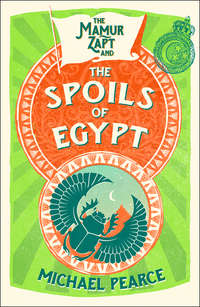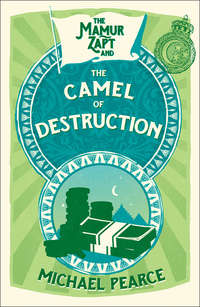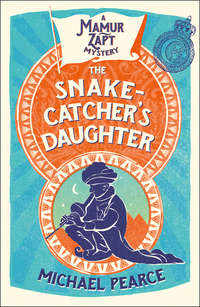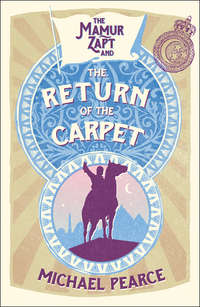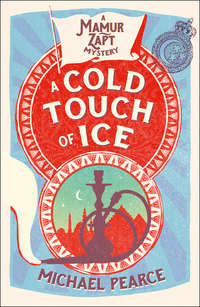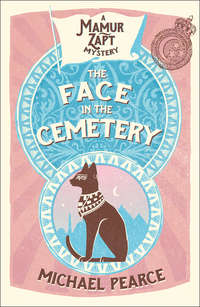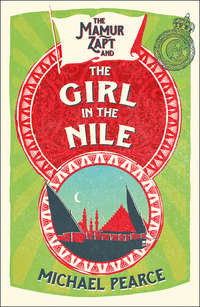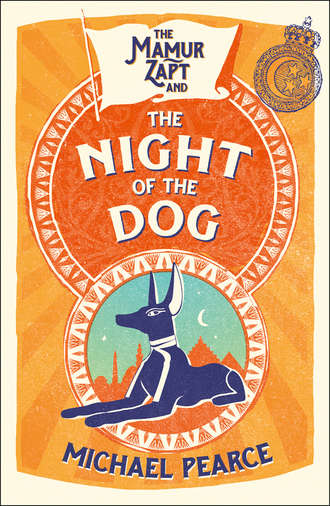
Полная версия
The Mamur Zapt and the Night of the Dog
It was one of the Consul-General’s aides, a personal friend of his.
‘Hello,’ said Paul, ‘I was trying to get you earlier but you were out. I need some help.’
‘Yes?’
‘Visitors. Important ones. Ones who need special handling.’
‘So?’
‘I at once thought of you.’
‘No,’ said Owen. ‘Definitely not. Much too busy. Quite out of the question. No.’
‘It is not I alone who thinks so. The Consul-General thinks so too.’
‘You put the idea in his head.’
‘We reviewed the possibilities together. I may have suggested there was a need for some dexterity. Political dexterity.’
‘You rotten sod.’
‘I have your interests at heart. Also my own. We don’t want this to go wrong.’
‘I’m sorry. I’ve got more important things to do.’
‘You haven’t. This has priority. So says the Consul-General.’
‘Bloody hell! I’ve got a lot on just now.’
‘Then put a lot off.’
‘Who the hell are these visitors?’
‘You only need to bother about one of them. Well, let’s say one and a half. He has a niece with him. He, John Postlethwaite, is one of the new intake of liberal MPs and has chosen to make a speciality of Egypt. This is because none of the other committees would have him. Retrenchment, Reform and Bolton’s backyard is all he really knows about. Oh, and accounts. He took Cromer to task over his and made something of a name for himself. That’s what gave him the idea. Of specializing in Egypt, I mean. He wants to come out and see things at first hand. The accounts, that is.’
‘McPhee sounds just the man for this,’ said Owen, selling the Assistant Commandant down the river without a qualm.
‘McPhee? Not in a million years. This is out of his class. This is a delicate exercise, boyo, and not for the McPhees of this world. Haven’t you been listening? We need someone with some political sense. This is important, I keep telling you. There’s a lot at stake. My job for a start. Yours, too, probably. It’s not trivial stuff like The End of Empire, Egypt’s Manifest Destiny, or England’s Moral Mission to Confuse the World (Christ! Did I say that? I’m going to have to watch my step for the next two months.)’
‘Two months? For Christ’s sake, I can’t spend that amount of time.’
‘You can do other things as well,’ said Paul magnanimously.
‘I’m afraid so,’ said Garvin.
‘But it’s going to take up hours,’ Owen complained. ‘Just when I’m especially busy.’
‘What are you busy on?’
Owen told him about the dog. Garvin, knowledgeable in the ways of Egypt, took it seriously.
‘Christ!’ he said. ‘If you don’t sort that out quickly they’ll be at each other’s throats.’
‘So I can concentrate on that and get someone else to look after Postlethwaite?’
‘You can concentrate on that and still look after Postlethwaite. Don’t spend too much time on him, that’s all.’
As Owen went out, Garvin said: ‘You’d better get it sorted out by the 25th.’
‘Why?’
‘That’s the Coptic Easter Monday. It’s also the day when the Moslems have a Moulid for some local saint or other. I think they do it just to be awkward. The problem is to keep the processions apart, because of course if they run into each other there’s all kinds of trouble, especially if things are a bit tense between them anyway. But that’s not till the 25th. You’ll have it all sorted out by then. I hope.’
CHAPTER 2
In deference to the susceptibilities of Moslem guests, the reception took the form of an English tea. The setting was appropriate. Once guests had been received and presented to the Consul-General’s wife, they passed out on to the beautiful Residency lawns. There, among the herbaceous borders, the great coloured splashes of bignonia, bougainvillaea and clerodendrons, the rose gardens and the citrus grove, they were served with tiny cucumber sandwiches and cups of tea by immaculate white-turbanned waiters. No alcohol was served, and the red-faced, heavy-jowled senior Army officers had to grit their teeth and wait for the hour of their release.
The arrangement suited the Member of Parliament for Warrington since he was a Nonconformist, a teetotaller and a Liberal, all three of which characteristics he assumed, correctly, to be rare in Army officers, especially in Egypt, which he seemed to confuse with the land of Sodom and Gomorrah. He kept a stern eye open for evidence of possible depravity in any young officer who approached his niece and Owen was glad that he had decided to appear at the reception in mufti.
It also helped that Owen was Welsh. Wales was, of course, a stronghold of Liberalism and Nonconformity and, slightly uneasy among all this exoticism, John Postlethwaite fell back on the things he was familiar with, which included, he thought, Owen.
‘I’ll want to see everything, mind,’ he warned Owen. ‘No pulling the wool over my eyes.’
‘I’ll want to see everything, too, Captain Owen,’ his niece said, ‘although, of course, they may not be the same things.’
‘The Accounts,’ said John Postlethwaite.
‘Egypt,’ said his niece.
So far, Owen had not been able to make out Miss Postlethwaite. For one thing, he couldn’t see her, since she had disappeared almost entirely under a huge sunbonnet. She had none of the racy, quasi-emancipated slang of the other girls and he might have taken her altogether for a shrinking Nonconformist violet had he not once caught a very sharp eye appraising him carefully from under the bonnet.
‘We might even be able to make a start on the Accounts now,’ he said, and led them over to an Egyptian he knew slightly who worked in the Ministry of Finance. The Egyptian took in the politics of the situation in a flash and moved smoothly into diplomatic conversation with the MP. Within seconds both were deep in technical matters.
‘That’s the Accounts taken care of,’ said Jane Postlethwaite. ‘What about me?’
‘What would you like to see?’
‘Cairo,’ said Jane. ‘You can start this evening.’
Mr Postlethwaite looked up uneasily.
‘We already have an engagement for this evening, my dear,’ he protested.
‘That is not an engagement,’ said Jane. ‘It is merely something laid on by the hotel.’
‘Nevertheless—’
‘You can go to that, Uncle John. I shall be quite safe with Captain Owen.’
Both uncle and niece were captured shortly afterwards by the Consul-General’s wife and Owen was left alone for a moment with the Egyptian.
‘What are you busy with just now?’ asked Ramses Bey, who knew what Owen’s work was.
‘Copts and Moslems.’
‘As usual,’ said Ramses, who was himself a Copt.
‘Is it as usual?’ asked Owen.
Ramses gave him a sideways glance.
‘Well,’ he said, ‘that’s an interesting question.’
‘I was hoping you were going to tell me if there was anything that might be making it unusual.’
‘I don’t think I shall be telling you anything,’ said Ramses.
He stretched out a hand for a passing cucumber sandwich. The waiter lifted the tray towards him. Between them a sandwich fell to the ground. Before either could move, a dark shape darted between them, scooped up the sandwich and flew off to the far end of the garden where McPhee, the Assistant Commandant, was locked in conversation with a rather intense Egyptian.
‘These damned hawks,’ said Ramses. He caught sight of McPhee.
‘Shall we rescue your colleague?’ he suggested. ‘He looks as if he might need it.’
McPhee glanced up with relief as they approached.
‘Just the man!’ he said to Owen. ‘Sesostris Bey feels that not enough is being done to protect the Coptic community. Have you met? Captain Cadwallader—’
Owen winced. He tried to keep his middle name hidden under a bushel.
‘—Owen,’ McPhee concluded with relish. He had a soft spot for legendary Celtic names, however dubious the descendency. ‘The Mamur Zapt.’
‘The Mamur Zapt?’ Sesostris looked at Owen sharply. ‘Yes, indeed.’
Both Copts were small, spare men and both wore modern European suits; but whereas Ramses dressed with elegance and even a touch of dash, Sesostris wore his with severe Coptic sobriety.
‘Why do you feel that not enough is being done to protect the Coptic community?’ asked Owen.
There was no hesitation about Sesostris. He plunged at once into a catalogue of grievances, wrongs which the Moslems had allegedly committed against the Copts. Most of them were trivial. A shop had been broken into here, stones thrown there. People had been jostled in the market or spat on on their way to church. A few incidents were more serious. Solitary individuals had been set upon by gangs of Moslem youths and beaten up. A prayer meeting had been disrupted. Owen made a mental note to check up on these. The list culminated, as he had half-expected it would, with the business about the dog.
‘Ah! The dog! Yes,’ he murmured. Over Sesostris’s shoulder he saw Ramses cock a quizzical eye.
‘It is no light matter,’ said Sesostris sharply. ‘We will not allow our dead to be insulted.’
‘There may have been no insult,’ said Owen.
‘Ah yes,’ said Sesostris. ‘I have heard of your theory.’
‘I have no theory yet. I am merely checking possibilities.’
‘Do not check too long,’ said Sesostris.
Ramses placed a restraining hand on Sesostris’s sleeve.
‘Surely Captain Owen is right to check,’ he protested. ‘There has been far too much precipitate action between Copt and Moslem.’
‘You would naturally think so.’
‘Why would Ramses Bey naturally think so?’ asked Owen.
‘Because he has taken sides.’
‘I work for the Government, if that’s what you mean.’
‘Copts have always worked for the Government,’ said Owen. ‘With their industry and talent it is a natural thing to do.’
‘Whoever governs Egypt, we do,’ said Ramses.
‘No, you don’t!’ said Sesostris, turning on him. ‘You merely think you do. It is our big mistake. By working with the Government we support it. We should work against it.’
‘Should you?’ asked Owen.
‘Yes,’ said Sesostris fiercely. ‘I know what you think, Captain Owen. You want what the British want. Power, and a quiet life. It is what every conqueror of Egypt has wanted. For two thousand years we Copts have worked with every Government. And for two thousand years every Government has been that of an invader. Perhaps it is time we changed our tactics.’
‘Enjoy what you have,’ said Owen, ‘or you might lose it.’
Sesostris smiled wintrily.
‘Threaten the Moslems, Captain Owen, not me. Or your life may not be quiet.’
He walked off.
McPhee spluttered indignantly.
‘Nasty fellow,’ he said. Then he caught Ramses’s eye, went red in the face and began to apologize profusely.
Ramses laughed and patted McPhee’s arm.
‘Don’t worry,’ he said ‘You’re not the only one who finds him difficult.’
The three of them walked back slowly to the centre of the lawn where the majority of the guests had congregated. A little knot had gathered around the Consul-General. Most of them were ministers. One of them, recently appointed in a reshuffle by the Khedive, and known to Owen, greeted him as he came up. Owen returned the greeting.
‘And how is your son getting on, Nuri Pasha?’ he asked.
The son was in France; for the benefit of his health.
Nuri Pasha raised eyes heavenwards. ‘At least he’s a long way away,’ he said.
‘And how is my daughter, Captain Owen?’ he asked in return.
Jane Postlethwaite, standing nearby, turned her face slightly under her sunbonnet.
‘Quite well, thank you, sir,’ Owen replied. ‘I rather expected she would be here.’
He scanned the crowd but Zeinab was nowhere to be seen.
‘She has a mind of her own,’ said Nuri. ‘Fortunately.’
He was pulled back into the inner circle.
‘He might not be here for long,’ said Ramses. ‘The word is that another reshuffle is on the cards.’
A man detached himself from the circle and made his way familiarly into the Residency.
‘That could be the man to watch,’ said Ramses. ‘He has done very well in our Ministry. The Consul-General likes him.’
‘Who is he?’
‘Patros Bey.’
A Copt.
McPhee had told Owen that there was a gathering of the Zikr that night so he thought he would take Miss Postlethwaite to it to show her some local colour.
‘The Zikr are a sort of sect, Miss Postlethwaite,’ he explained. ‘Moslem, of course. The name refers to their practice of repeating the name of God, Allah, innumerable times.’
‘It sounds very interesting,’ said Miss Postlethwaite doubtfully.
Owen laughed.
‘That’s not all there is to it. They whirl and dance and eat fire and that sort of thing. Sometimes they stick knives in themselves. In fact, they used to carry things to such an extreme that a few years ago the Government was obliged to step in and ban the most excessive practices.’
‘Did they accept the ban?’
‘More or less. You see, it was done with the support of their Grand Mufti—the religious leader so far as ecclesiastical law is concerned—who thought that the whole thing had become too self-indulgent.’
‘Sticking knives in themselves is self-indulgent?’
‘In theological terms, yes, apparently.’
Miss Postlethwaite was silent for some time. Then she asked: ‘Are you a theologian, Captain Owen?’
‘I will introduce you to my colleague, Mr McPhee, the Assistant Commandant of the Cairo Police, who has a great interest in local theology and religious customs. However,’ said Owen, who did not feel that this line was particularly promising, ‘there will also be snake-charmers, acrobats, jugglers, that sort of thing, which I hope you will find equally interesting.’
Well before they reached the place where the Zikr were assembled they heard the sound of drumming and tambourines and as they came into the square they saw that the Zikr had already begun their chanting. There were about thirty of them, sitting cross-legged upon matting in the centre of the square, forming a kind of oblong ring. In the middle of the ring were three very large wax candles, each about four feet high and stuck in a low candlestick. In their light the Zikr could be seen clearly, staring at the flames, swinging their heads and bodies in time to the music, and chanting repeatedly ‘La illah illa Allah—there is no god but God.’
As these were still in the nature of ‘warming up’ exercises, the crowd took no great interest, concentrating instead on the ancillary services inseparable from any public occasion in Cairo. They clustered round the tea stalls, coffee stalls, sherbet stalls and sweetmeat stalls and sampled the chestnuts from the braziers at the foot of the trees. They watched with only an apparent lack of interest the tumblers, jugglers, snake-charmers, baboon-walkers, flute-players and story-tellers competing to entertain them. And they were lured in surprising numbers to the dark edges of the square, where veiled women from the villages read their fortune in the sand.
Owen took to all this like a Cairene; not so much the goods or turns in themselves as the pretext they provided for backchat and bonhomie. He had long ago come to the conclusion that the chief business of the Egyptian was conversation and that Egyptian institutions should be judged by the contribution they made to that. By that criterion the stall-holders, street-vendors and performers rated high. Round every stall was a knot of people all arguing vigorously. Owen would have liked to have joined in and normally would have done so. However, he felt slightly constrained by Miss Postlethwaite’s presence. He wondered, indeed, as he piloted her round the various turns in the open parts of the square, whether she was enjoying herself.
Once, she gave a little jump. This was when a baboon belonging to one of the street-performers put its hand in hers. Owen gave it the necessary milliemes and it released her hand and scuttled back to its owner.
‘Don’t be alarmed, Miss Postlethwaite,’ he said reassuringly. ‘They’re quite harmless. They look rather unpleasant, I know, especially when they’re exploited like this. But they’re the very same creatures as appear in the paintings in the Tombs.’
It sounded horribly like the patter of the dragomans as they showed tourists round the Pyramids.
‘Really?’ said Miss Postlethwaite; slightly distantly.
She revived a little when they left the turns behind them and began to thread their way through the stalls. As always with a Cairo crowd, there was immense ethnic variety, and her interest seemed genuine as Owen pointed out the different types: the Nubians from the south, with their darker skins and scarred cheeks; the Arish from the Eastern Desert, the hawk-faced men with silver-corded headcloths and striped burnooses, their women unveiled but with their feet covered, as opposed to the ordinary Cairo women who exposed their legs but kept their faces concealed. He drew her attention to the dark turbans of the Copts. Was it his imagination or were there rather a lot of them? This was, after all, a Moslem occasion. He was beginning to think he had Copts on the brain when he heard one or two of the sweetmeat-sellers calling out, ‘A grain of salt in the eye of him who does not bless the Prophet,’ the traditional cry for warding off bad luck, and knew he was not mistaken.
He bought Miss Postlethwaite a sherbet at one of the stalls and asked the stall-keeper why there were so many Copts around.
‘Didn’t you know?’ the man said. ‘This is the Moulid of Sheikh Darwish El-‘Ashmawi. All the expenses are paid by a Copt who became a Moslem.’ He grinned. ‘They don’t like to see their money go so they come and eat it up.’
‘To your great benefit, no doubt.’
The man mopped up a spill on the counter.
‘I wish the benefit was greater,’ he said.
‘What is a Moulid?’ Jane Postlethwaite asked.
‘It’s a sort of feast-day for the local saint. In Egypt there are lots and lots of saints. Every village has one. Most have several. There are feast-days all the time. Everyone has a lot of fun.’
‘Saints,’ said Jane Postlethwaite, ‘and baboons!’
A change in the tempo of the drumming drew their attention back to the Zikr.
‘The party’s starting,’ said Owen, standing up. ‘It’s time for us to go.’
To one side of the Zikr was a roped-off enclosure for the elderly and more decorous. In it they were given cushions and coffee and settled back to watch developments. They were not long in coming.
In their absence the chanting had become more complex. Now it was more like an English catch-song or round. One group of Zikr would take up a phrase, embroider it and then give it to the others. In turn they would repeat it, embroider and give it back again. Gradually, the process became faster and faster until there was hardly a gap between the giving of a phrase and receiving it back again and all the Zikr seemed to be shouting all the time. The music rose to a crescendo.
Suddenly, one of the Zikr leaped into the middle of the ring and began to utter loud gasps in time with the words of the others. More and more of the Zikr joined in until they were all on their feet gasping in unison.
The gasping quickened. Someone else sprang into the centre of the ring and began to spin like a top, the skirt of his gown flying out around him like a huge umbrella. Other Zikr started to jump up and down and some of them rushed round the ring contorting their bodies and making little stabbing motions with their hands. All of them were screaming. The music rose to new heights. The uproar was terrific.
The man swirling in the centre stopped and stepped out of the ring. For a moment the music faltered. Then there was a piercing scream and another man sprang into the centre. He was very tall and black, a Nubian of some sort, and at once he began to leap up and down, holding his arms up so that his hands were locked above his head, all the time screaming ‘Allah! Allah! Allah!’ He went on like this for several moments and then collapsed foaming on the ground. Two of the Zikr carried him aside.
The music faltered again and then began to pound even more insistently. Another Zikr sprang forward. This one kept bounding into the air, beating his breast and calling out, until suddenly he rushed to one side, picked up a short Sudanese stabbing spear and plunged it into his body. It seemed to have no effect. He did it again with another spear and then another. In a moment he seemed to be bristling with them.
Another Zikr began calling out for fire. Someone brought him a small copper chafing-dish full of red-hot charcoal. He seized a piece of charcoal and put it in his mouth. He did the same with another and another until his mouth was full, and then he deliberately chewed the live coals, opening his mouth wide every few moments to show its contents. When he inhaled, the coals glowed almost to white heat; and when he exhaled, sparks flew out of his mouth.
Someone brought a thorn bush into the ring and set it alight. One of the Zikr took it and thrust it up inside his robe, all the time continuing with his dancing. As he whirled round, his robe billowed out and the flames blazed up, so that his gown seemed full of fire. There was the great blaze in the darkness and above it the exalted, ecstatic face looking up to heaven.
Everywhere, now, was fire. And everywhere, too, men were rushing around with daggers and spears sticking in their throats, cheeks, mouths, faces, stomachs and chests. They danced and whirled and cried ‘Allah’ continuously. The drums beat on, the flutes shrilled, and the music swirled to new heights of passion. All over the square now people were dancing and jumping.
Beside Owen, an elderly man sprang to his feet, tore off most of his clothes, and leaped into the circle. In a moment he was jumping skyward, his face contorted, his chest heaving with great gasps of ‘Allah’.
The Zikr danced on and on. They did not seem to tire, nor did they seem affected by the stabbing or the fire. After whirling for perhaps five or ten minutes they would stop and step out of the ring for a moment, apparently steady and completely free from giddiness. They would pause only for an instant and then rejoin the ring.
Towards midnight the music slackened. No new coals were brought, and as the flames died out, the Zikr quietened. Their dance became a steady rhythmic leaping. Their voices, hoarse now, could manage only a rapt murmur of ‘Allah’. One by one they fell out of the dance and collapsed to the ground, until there were only two or three whirling in the middle. Eventually, their spinning, too, came to an end.
The music stopped.
A great sigh rose from the onlookers like a collective release. It was as if a spell had been broken. They sat back and as it were rubbed their eyes.
For a moment or two there was silence. And then one or two people began to talk, quietly at first but then more animatedly, and soon normal babble was resumed.
A white-bearded Zikr attendant came round with coffee and then, noting Miss Postlethwaite, returned with almond cakes.
‘We should eat them,’ said Owen, uneasily aware of the hour and thinking about Mr Postlethwaite back in the hotel. ‘It is wrong to refuse hospitality.’
‘I would not dream of doing so,’ said Jane Postlethwaite, and tucked in with relish. ‘It is not, of course, the kind of religious occasion that I am used to but it was most interesting.’
Owen was relieved. It was some time since he had been to a Zikr gathering and he had forgotten what strong meat it was.
A Zikr walked past him. Owen recognized him as the one who had put the blazing thorn bush inside his gown. He was dressed now only in a loin-cloth—the gown had burnt. Owen looked at him closely. There were no traces on his skin either of burns or of thorn scratch marks. He looked over to where some of the other Zikr were standing. These were ones who had stabbed themselves with spears and swords and one or two of them still had knives sticking in them. They looked very, very tired but not hurt. There was a thin trickle of blood coming from some of the wounds. It was nothing like the mutilations, however, which some of the sects practised. These were often combined with self-flagellation and then there was blood everywhere. In the case of the Zikr the intention was not to humiliate but to exalt, to demonstrate the imperviousness of the body when it is caught up in Allah’s holy rapture.


